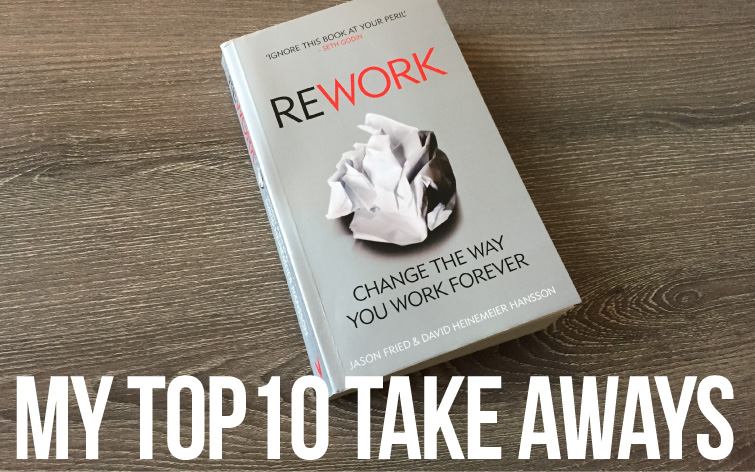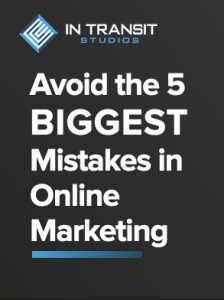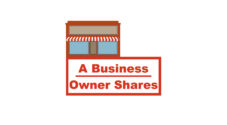For my first post of 2017 I’ve decided to highlight 10 takeaways from“REWORK,” an incredible book I just finished. It’s from the guys of Basecamp, the project management software I’ve loved and used for over 3 years. Now, I’m no quick reader and I’ve long feared I have the reading level of an 8th grader (partially kidding here) but I thought this book would take me a month when it only took me 2 weeks. And what an incredible 2 weeks it was! I’ve listed out and expanded on the top points that really struck a chord with me and that I hope will inspire or encourage you as well!
1) Ignore The Real World
Years ago a friend of mine once said, “So you’re starting your own business? You know you won’t make any money for at least 5 years.” Well I’m in my seventh year of business and I can assure you that isn’t true. I realize that his heart was in the right place but I’m sure that statement came right out of a business book that he read at some point. My point is, if you’re in business or particularly business for yourself, you have to ignore or brush off 90% of “advice” you get.
Technology, our economy and the way business works now is destroying typical corporate structures and much of what we learned in school. In the freelance world, there are no rules, there are no limits, there are no salary caps, there are no right or wrongs. Technology changes so fast that new business opportunities are opening up on a daily basis and ways to expand your own business are endless.
If I had listened to many of those around me, my high school guidance counselor, worried family that meant well, etc, I wouldn’t be in this position I am in today. I probably would’ve been paralyzed by fear, afraid to take risks and would be in debt from a 4 year school while working a job I wouldn’t love. I’m not saying my path is “the right” path, I’m just saying you don’t have to do what everyone else does. You can now, with technology and endless possibilities at our finger tips, ignore the “real world.”
“This real world sounds like an awfully depressing place to live. It’s a place where new ideas, unfamiliar approaches and foreign concepts always lose.” Pg. 13
2) Planning is Guessing
Nothing ever goes perfectly according to plan and most everyone across all industries will tell you that. Sometimes a project doesn’t veer too far off course but it rarely, if ever, goes “exactly” how you planned it, and that’s ok. I used to feel like I failed in some way if a project grew legs or had to be reworked or added on to but this book really hammers the point home that a plan is nothing more than a guideline to the eventual goal. It’s guessing at it’s finest.
If you make a perfect plan and something derails you it can often lead to feeling stressed or in-content. But having a plan written in pencil, not in pen, is the best way to go because there may be better, more efficient ways to get things done and new ideas that are thought up along the way. Planning for failures and bumps along the way is another biggie. Prepare for delays and hardships with every project, then you won’t be taken off guard when it happens.
“Unless you’re a fortune-teller, long-term business planning is a fantasy.” Pg. 19
3) Why Grow?
Ah I needed to hear this. There’s such an emphasis these days on getting bigger, faster, more complex, adding employees, etc. I’m not quite sure why I’ve felt that as not many people have said that directly but even in Columbus, Ohio where I’m based, the pace seems to be getting faster and faster. I can’t imagine New York, Chicago or the larger cities with the stiffest competition.
But that simple question is so valid. Why grow? If things are great right now and business is strong and people and customers are happy, why rush into adding more complexities, employees, etc? This book makes a great point in saying that if your company is flourishing with 5 or 10 employees, why feel the need to grow it to 20 or 30 immediately? That’s just going to add more stress, problems and headaches that aren’t yet needed.
Questions I hear the most are “So are you going to start adding employees?” “Are you going to get a real office?” “Are you getting any big name clients?” Mmm…why take on all that extra stress when I don’t need to right now. I’m quite content right where I am in this season of biz life.
“Grow slow and see what feels right – premature hiring is the death of many companies.” – Pg. 22
4) Interruption is the enemy of productivity
There are a million things to distract us from doing meaningful work at any given moment and it’s a constant fight to ignore them. I’ve been working on this in particular for the last couple years and it’s even more of a priority for me now. I’ve realized that, especially being in the creative field, I need to block out “alone time” for my work in order to do it effectively. This book makes a great point that if you work on a project for 20 minutes, then bounce to another, then talk with a co-worker for a bit, then Facebook for a little bit, then go to lunch, then have a meeting, then work for a little bit, etc – you’re not going to accomplish much meaningful work in a typical 8 hour day.
So I now set blocks of time where my email is off, phone is on airplane mode, notifications are off and I just work. I’m amazed at how much I can get done in 2 or 3 hours of uninterrupted time and it’ll amaze you as well if you try it.
“Your day is under siege by interruptions. It’s on you to fight back.” Pg. 106
5) Say No By Default
I wrote about this in my last post but the point again stuck out to me. You have to learn how to say “no.” And REWORK makes a good point of saying it by default. The more successful you get, the more opportunities you have to pull you away from your mission and therefore the better you have to be at saying no. It’s doesn’t have to be in a mean or condescending way but more often than not it needs to be said.
What are you saying yes to that’s taking up too much of your time or distracting you from meaningful work?
“You rarely regret saying no. But you often wind up regretting saying yes.” Pg. 153
6) Out-teach your competition
When you’re a small business and just starting out, your competition is bigger than you, has more clients than you, has more connections than you, etc. It’s hard to get an edge on any competitor when you’re just starting out but there is one area that you can capitalize on immediately: Out-Teaching your competition. Most businesses are focused on getting new clients, improving on systems in place, hiring, etc but not many are worried about educating their customers.
This will look different depending on the industry that you’re in but for me I noticed a big trend in web design. Most clients would get a nice new website but have no idea how to utilize it, how to market it or what to do next. I came up with a moving forward page that outlines the steps I recommend taking once a site is live and how to grow your online presence. I also just launched a client resources page with training videos on how to read and understand Google Analytics, SEO, utilize Facebook Ads and more. This first small step in educating my clients has had a tremendous impact already. My clients now view me not only as a designer, but an educator and a consultant for their business.
“Teach and you’ll form a bond you just don’t get from traditional marketing.” Pg. 173
7) The myth of the overnight sensation
Get rich quick schemes have no place in the very real world of freelance, or most every other kind of business today. Get rich slowly, patiently and steadily is more like it. Any amount of worthy success won’t happen overnight and frankly, any success that happens quick is often not appreciated. I see so often people who quit their jobs and try a new venture and give it 3 months to work. Perhaps that’s because of our instant gratification society, but it’s not realistic.
If you’re going to do anything and be successful at it, it’s going to take some time. You’ll need to have patience, understanding and you’ll need to prepare for delays, set backs and failures along the way.
“You know those overnight-success stores you’ve heard about? It’s not the whole story.” – Pg. 196
8) Send people home at 5
This may have been the most important message that I needed to hear throughout the entire book. Coming from a blue collar background, I’ve been trained and used to working a minimum of 40 hours a week. That kind of work ethic is a good thing, don’t get me wrong, but I’ve learned over the years of running this business that the amount of hours you work aren’t nearly as important as what you get done in those hours.
There are some days where I need to work late, work on a weekend or pull a 10 hour run but most days I find that I can get done what I need to get done within 6-8 hours. Sometimes less. Now if I find myself just sitting at my desk with no inspiration or juice to keep going, I’ll call it. 5 hours of good, quality, productive work is better than 8 hours of mostly just sitting there taking up space in a seat. You think corporate America is on average getting 8 hours of real work from all employees?
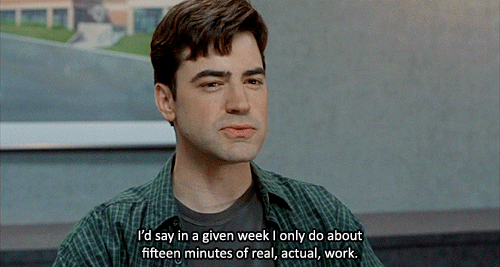
Courtesy of: http://www.huffingtonpost.com/2014/02/10/office-space-gifs_n_4761929.html
“You don’t need more hours; you need better hours.” Pg. 258
9) Sound like you
This is also one of the biggest things I’ve learned in the success I’ve had so far; talk like YOU talk. Sound like you. That doesn’t mean you shouldn’t be professional or have good grammar but people want to communicate with real, down to earth people. Not some stiff, robot sounding suit guy.
In this modern day economy, formal jargon is quickly on it’s way out. I’ve learned that my “tone” can very easily come across in emails and messages by avoiding stuffy corporate style lingo. Be real, be cool and sound like you – it’ll go a long way and make you seem more approachable.
My personal favorite: “Kind Regards” at the end of an email. Who says Kind Regards?
“Who said writing needs to be formal? Who said you have to strip away your personality when putting words on paper? Forget rules. Communicate!” Pg. 263
10) ASAP is poison
When I get started on a project, I assume ASAP is implied. Everyone wants their work done as quickly as possible. That’s true across the board, across all industries. But when people say they need things ASAP all the time, REWORK makes a good point in saying that it devalues the meaning of that language. I’m fortunate in that I have a great client base that is mostly all very understanding of my time and workload but I’ve run into plenty of clients who constantly need their work ASAP like someone’s going to live or die when the truth is, a few days or week difference wouldn’t matter.
This is especially important when talking to employees or those who you’re working with. When I subcontract any work out, I’ve made it a goal not to say ASAP. That puts unneeded stress and pressure on a job for a creative. I try to give them a realistic deadline to hit and if it’s urgent, to try and stress that urgency without making it seem like life or death. Besides, ASAP is relative. ASAP could mean 5 minutes or 5 days.
“So reserve your use of emergency language for true emergencies. The kind where there are direct, measurable consequences to inaction. For everything else, chill out.” Pg. 268
Well I hope this has been encouraging to you! I’ve never done any sort of book review but this read was too good and impactful not to at least highlight my top 10 takeaways. There are several more I could’ve listed and I’ll say, this is a VERY easy read – with a picture describing each topic every few pages, it makes this a very enjoyable business book read.
I highly recommend picking up a copy and I’d love to hear your thoughts as well. You can find it here: https://37signals.com/rework
Here’s to a new year and reworking your business mindset!
Kind regards, 😉
– Josh
